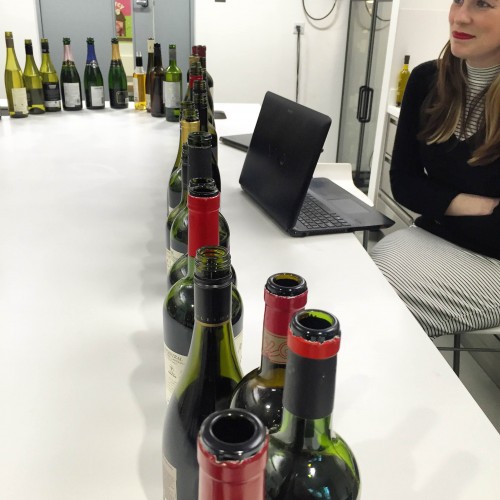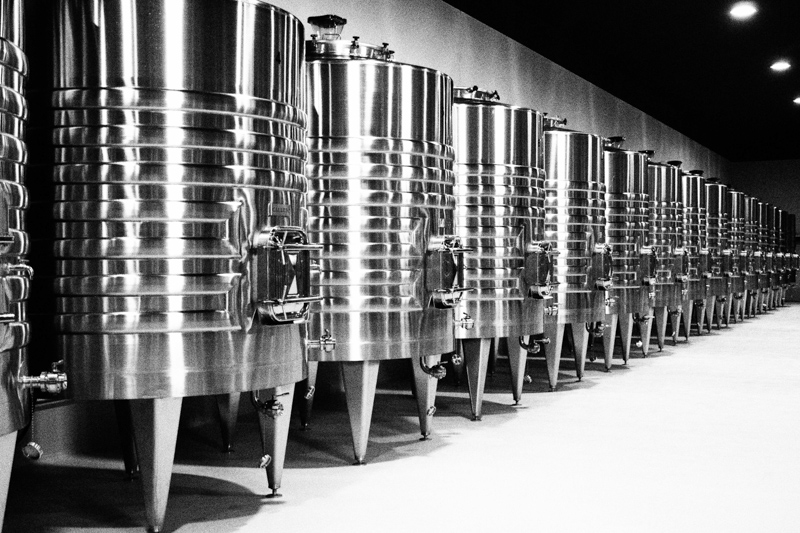
There are few absolutes in the world of wine. The words ‘sometimes’, or ‘often’, or ‘may be’ usually need to be appended to statements such as the title of this post. With that said, onto the thorny subject of own or private label wines.
Private label is on the rise. Increasingly, supermarkets are filling their shelves with own-brand wines, and there’s less space available for branded product. And the major UK mail order/internet wine sales companies have a model that has relied almost exclusively on private label.
Generally, private label is bad for wine, but I can see ways in which it could be positive, and some people do it well. So I can’t definitively state that private label is bad; I have to qualify my statement by saying that it’s usually a bad thing.
The most honest sort of private label is a supermarket own label, such as Tesco Finest, Asda’s Extra Special or Sainsbury’s Taste the Difference. To the customer, it is clear that the supermarket buyers have sourced the wine themselves, and have cut out a margin by bottling it under their own label. At least the customer knows what they are getting. The hope is that they are getting a wine that tastes like where it comes from, but this isn’t always the case.
The less honest sort is the soft brand, where a retailer makes it look like the private label wine is made by a producer, making up a name for it and designing a label to make it look like a producer-owned brand rather than retailer private label. This is almost always done to hide high margin.
For example, Laithwaites and Naked Wines have built their business around private label soft brands, which are exclusive to the retailer. These are high margin products which allow them to use powerful promotional mechanics and still make money. Naked’s twist on this theme is to use well known winemakers as buyers to source wine for them, label the sourced private label wine with the winemaker’s name, and make it look like this is the winemaker’s ‘own’ wine. In a sense, it is, but it is exclusive private label and the margin requirements are pretty bold.
Why is private label bad? It doesn’t give the producer brand equity. These days, the key challenge to wine producers is access to market, and increasingly they are having to use a multichannel strategy. Those less adept at selling through the various channels end up being in a very weak negotiating position, and may end up selling a lot of their wine without getting any brand equity. And without brand equity, you have no power in any negotiations. This helps fuel the race to the bottom in wine retail, something I have discussed before.
Private label is bad for the consumer, because most of the time they end up paying rather too much for a pretty mediocre wine. As a consumer, I want to know who made my wine. Even at the bottom end, I like the producer to get the credit.
Can private label ever be a good thing? The Wine Society’s Exhibition Series shows that when the buying is done well, from good producers, then the results are worthwhile. The same goes for the own label wines from the likes of Berry Bros & Rudd, Tanners and Fortnum & Mason (these are exceptional). In each case, it’s because the fundamental business of each retailer is sound, producer-badged wines that are bought for quality reasons. Marks & Spencer are an example of a retailer that just does private label, but who do it very well: they buy very well and proudly show the name of the producer on each wine.
But this is normally not the case. So I’d advise anyone not to shop with retailers who are largely or exclusively private label. It’s not good for wine, and it’s not good for the consumer.
9 Comments on Why private label/own brand is bad for wine

Hi Jamie
Great insight here, well done for writing it.
Particularly resonant was the comment on producers’ access to market.
See you next time you’re in the Cape mate.
D
I wonder if, as you suggest, a supermarket own label is actually “more honest”?
Seems that it opens up the possibility of the “fill” differing from year to year (simply source the tanks the producer deems unfit for their own label, and offer them a lower price to take it off their hands).
Certainly many of Sainsburys/Tesco wines, despite claiming to have a certain provenance by naming the winemaker/producer, never seem to hit the grade that person/company achieve with their proprietary brands.
There’s also the thorny issue of bulk-shipped own label wines, which seem to have an uncanny knack of varying massively in quality from bottle to bottle (or more accurately, bottling to bottling).
I needed this when arguing (er, vigorously discussing) the issue with my cousin who is a manager for a certain large German chain here in Australia.
She kept on repeating that a $5 wine can be good (no argument there) & I kept saying “yes, but it’s not sustainable”.
In Australia one of the major supermarkets (which also owns the main discounting wine chain) has a huge long list of trademarked names precisely so the shelves can be stocked with small-producer ‘looking’ wines that are all BOB.
In the end it’s consumers who are shortchanged because they enter a massive wine warehouse which has the illusion of choice and a wide range when really there is neither.
An excellent piece Jamie, shame more wine journalists don’t speak up.
Having been a Virgin Wines customer for over 15 years I don’t buy anything from them any more, as too many of the wines (even in the supposed “Gold Club Discovery” cases) are soft brands. The whites, in particular, are usually bottled somewhere in the UK, and as Damien says vary widely in quality. Even those supermarket own label wines that claim to be made by well-known producers are often of poor quality. I recall trying a couple of supermarket NZ sauvignons a year of so ago which had the names of large, but reliable, producers on the back and the wines were a pale imitation of the producers’ own, “proper” stuff.
Tried a private label Primitivo from Sainsbury’s at the weekend.
If you’ve never tried the grape variety, you’d never want to ever again after that! (insipid, thin, too drying from lack of fruit character)
So one of the saddest aspects of the practice is it can put people off experimenting for life. That’s got to be the real tragedy for the wine industry.
Frankly, I disagree. The wine industry wants to have its cake and eat it too, meaning having commercial success without wanting to deal with commercial realities.
To suggest that private labeling is bad in and of itself doesn’t make any sense. The brand is created, the wine goes in the bottle, and that’s it. Consumers will make their own choice about whether it represents value for money to them, and the brand will live or die on that basis. Whether or not it is a ‘real’ brand, whether the producer is known, whether the margin is high, mean absolutely nothing. You say that you want to know who is making your wine, great, but there are a great many people who couldn’t care less, and want to buy a bottle just because it has a funny or quirky label, what about them?
Articles and viewpoints like this just add to the intimidation factor for new wine drinkers, and do much more harm to the industry than private labels could ever do.
You also comment that producers “less adept at selling through the various channels end up being in a very weak negotiating position…”, well, get more adept at it! This is business! Companies in other industries face the same issues, why shouldn’t wine companies?
And to suggest that consumers are worse off because they pay too much for a mediocre wine, so what? They won’t buy it again, and the marketers will need to do a better job next time. Who are you to say what is good value to the average consumer, frankly it is up to them.
Adam, thank you very much for letting us know that the market always finds the right balance between the interests of companies and consumers. I still don’t see it, but it is great that some people do!
I couldn’t agree more. This is my main beef with Total Wine & More. They have such a great store, but many of the private label wines are plonk.